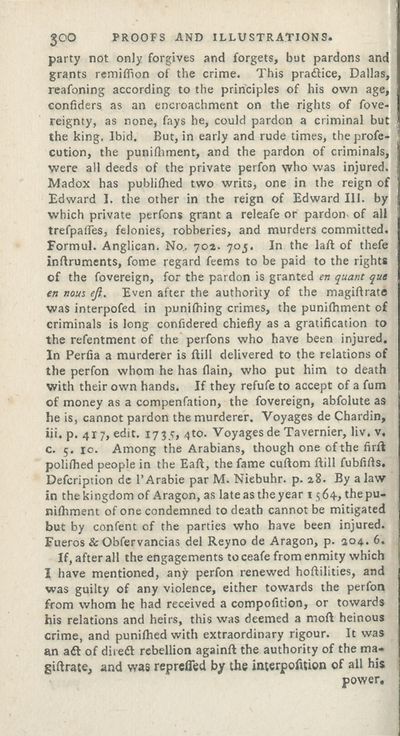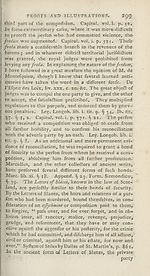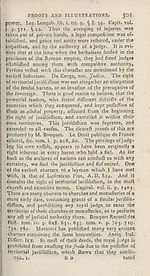Download files
Complete book:
Individual page:
Thumbnail gallery: Grid view | List view

300 PROOFS AND ILLUSTRATIONS-
party not only forgives and forgets, but pardons and
grants remiflion of the crime. This praftice, Dallas,
reafoning according to the principles of his own age,
confiders as an encroachment on the rights of fove-
reignty, as none, fays he, could pardon a criminal but
the king. Ibid. But, in early and rude times, theprofe-
cution, the punifiiment, and the pardon of criminals,
were all deeds of the private perfon who was injured.
Madox has publifhed two writs, one in the reign of
Edward I. the other in the reign of Edward III. by
which private perfons grant a releafe or pardon of all
trefpalfes, felonies, robberies, and murders committed.
Formul. Anglican. No. yoi. 705. In the lafl of thefe
inflruments, fome regard feems to be paid to the rights
of the fovereign, for the pardon is granted en quant qut
in nous eft. Even after the authority of the magiftrate
was interpofed in punilhing crimes, the punilhment of
criminals is long confidered chiefly as a gratification to
the refentment of the perfons who have been injured.
In Perfia a murderer is ftill delivered to the relations of
the perfon whom he has (lain, who put him to death
with their own hands. If they refufe to accept of a fum
of money as a compenfation, the fovereign, abfolute as
he is, cannot pardon the murderer. Voyages de Chardin,
tii. p. 417, edit. 1735, 4to. Voyages de Tavernier, liv. v.
c. 5. 10. Among the Arabians, though one of the firft
poliihed people in the Eaft, the fame cuftom ftill fubfifts.
Defcription de 1’Arabie par M. Niebuhr, p. 28. By a law
in the kingdom of Aragon, as late as the year 1564> thepu-
nilhment of one condemned to death cannot be mitigated
but by confent of the parties who have been injured.
Fueros & Obfervancias del Reyno de Aragon, p. 104. 6.
If, after all the engagements toceafe from enmity which
I have mentioned, any perfon renewed hoftilities, and
was guilty of any violence, either towards the perfon
from whom he had received a compofition, or towards
his relations and heirs, this was deemed a moft heinous
crime, and punilhed with extraordinary rigour. It was
an aft of direft rebellion againft the authority of the ma¬
giftrate, and was repreffed by the mterpofition of all his
power.
party not only forgives and forgets, but pardons and
grants remiflion of the crime. This praftice, Dallas,
reafoning according to the principles of his own age,
confiders as an encroachment on the rights of fove-
reignty, as none, fays he, could pardon a criminal but
the king. Ibid. But, in early and rude times, theprofe-
cution, the punifiiment, and the pardon of criminals,
were all deeds of the private perfon who was injured.
Madox has publifhed two writs, one in the reign of
Edward I. the other in the reign of Edward III. by
which private perfons grant a releafe or pardon of all
trefpalfes, felonies, robberies, and murders committed.
Formul. Anglican. No. yoi. 705. In the lafl of thefe
inflruments, fome regard feems to be paid to the rights
of the fovereign, for the pardon is granted en quant qut
in nous eft. Even after the authority of the magiftrate
was interpofed in punilhing crimes, the punilhment of
criminals is long confidered chiefly as a gratification to
the refentment of the perfons who have been injured.
In Perfia a murderer is ftill delivered to the relations of
the perfon whom he has (lain, who put him to death
with their own hands. If they refufe to accept of a fum
of money as a compenfation, the fovereign, abfolute as
he is, cannot pardon the murderer. Voyages de Chardin,
tii. p. 417, edit. 1735, 4to. Voyages de Tavernier, liv. v.
c. 5. 10. Among the Arabians, though one of the firft
poliihed people in the Eaft, the fame cuftom ftill fubfifts.
Defcription de 1’Arabie par M. Niebuhr, p. 28. By a law
in the kingdom of Aragon, as late as the year 1564> thepu-
nilhment of one condemned to death cannot be mitigated
but by confent of the parties who have been injured.
Fueros & Obfervancias del Reyno de Aragon, p. 104. 6.
If, after all the engagements toceafe from enmity which
I have mentioned, any perfon renewed hoftilities, and
was guilty of any violence, either towards the perfon
from whom he had received a compofition, or towards
his relations and heirs, this was deemed a moft heinous
crime, and punilhed with extraordinary rigour. It was
an aft of direft rebellion againft the authority of the ma¬
giftrate, and was repreffed by the mterpofition of all his
power.
Set display mode to:
![]() Universal Viewer |
Universal Viewer | ![]() Mirador |
Large image | Transcription
Mirador |
Large image | Transcription
| Antiquarian books of Scotland > Kings & rulers > History of the reign of the Emperor Charles V. > Volume 1 > (318) |
|---|
| Permanent URL | https://digital.nls.uk/109186147 |
|---|
| Description | By William Robertson. London : Cadell and Davies, 1798. |
|---|---|
| Shelfmark | ABS.1.76.13 |
| Additional NLS resources: | |
| Description | Thousands of printed books from the Antiquarian Books of Scotland collection which dates from 1641 to the 1980s. The collection consists of 14,800 books which were published in Scotland or have a Scottish connection, e.g. through the author, printer or owner. Subjects covered include sport, education, diseases, adventure, occupations, Jacobites, politics and religion. Among the 29 languages represented are English, Gaelic, Italian, French, Russian and Swedish. |
|---|

